
Heavener International Case Competition
Feb 8-14, 2026 | Warrington College of Business
How do your strategy skills stack up?
In the Heavener International Case Competition, you’ll test them and build your reputation against tomorrow’s global business leaders.
Consider yourself an agile critical thinker or an innovative problem solver? Prove it as you tackle two real-world cases with three of your classmates and prepare to present against teams from the world’s top business schools.
What to expect
Maybe you’ll reposition a major brand, rework a marketing campaign, or plan a product expansion. The University of Florida’s Heavener School of Business — home to the Warrington College of Business’ BSBA and BABA programs — collaborates with our sponsors to develop cases based on the challenges companies and industries face in our current climate.
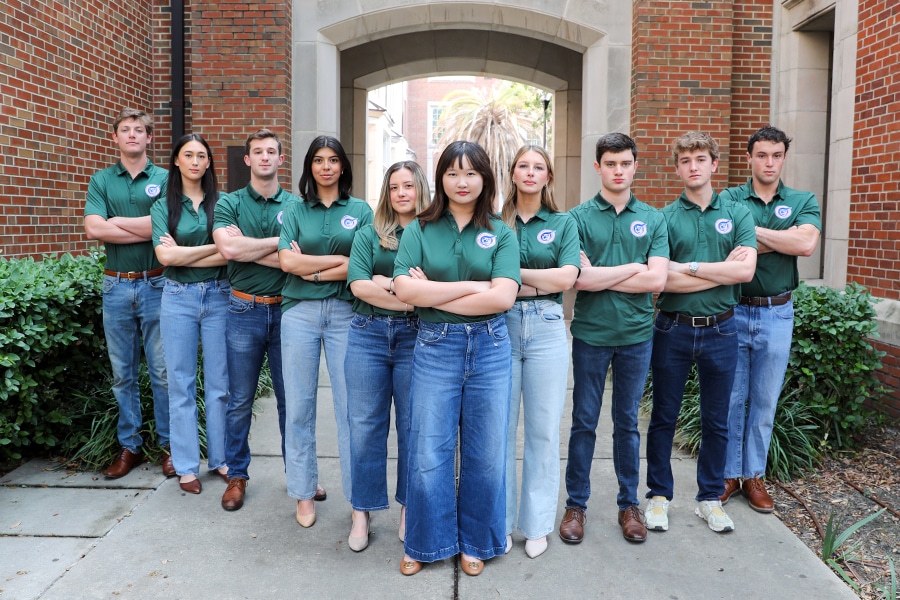
Teams
The Heavener International Case Competition invites a diverse group of undergraduate students, hand-selected by some of the most globally recognized business schools. Once here, teams are divided at random into four divisions.
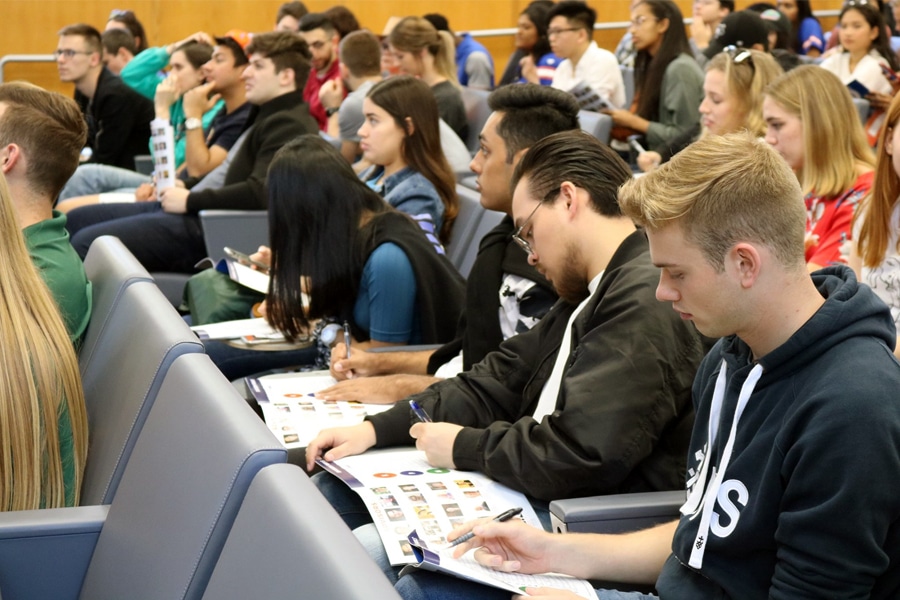
Preparation
Gear up like an established business professional: Ahead of your arrival, research all there is to know about our sponsors, from products and branding to industry competition, market trends, and international presence.
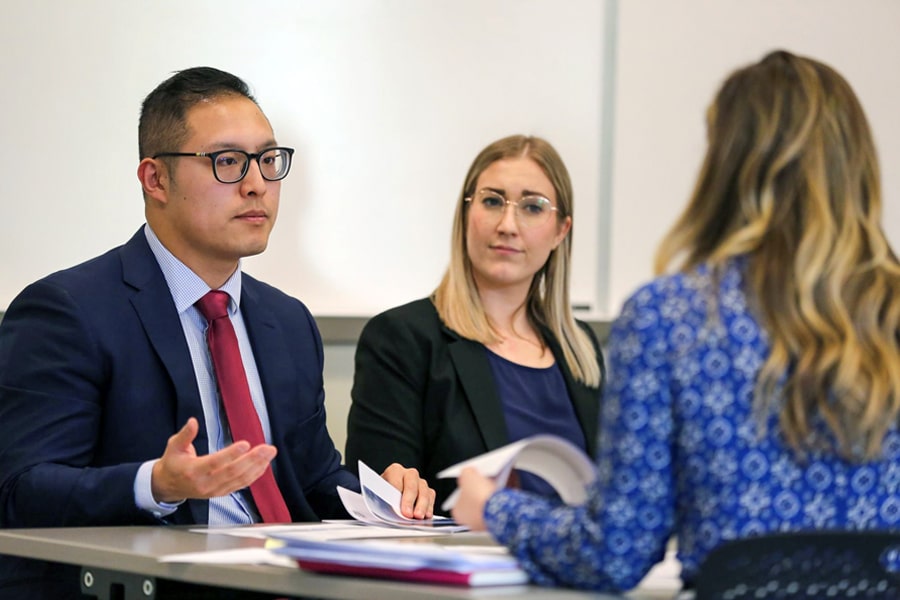
The challenges
We’ll present two cases. For both, you’ll have a certain amount of time to develop your strategy before making a three- to five-minute presentation to a team of executives. Following, you’ll field their questions during a 20- to 22-minute session.
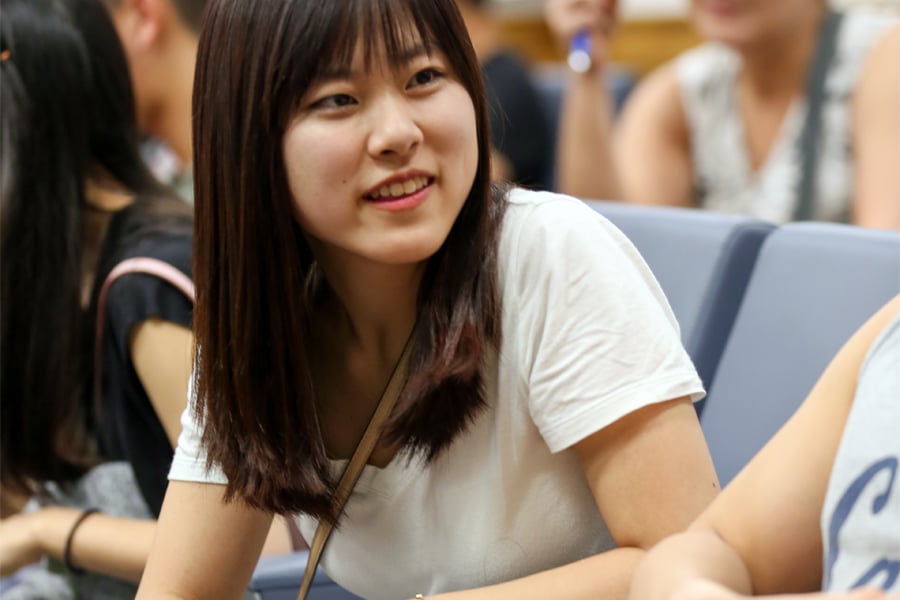
Global exposure
Business practices and philosophies vary the world over. You’ll learn about approaches and applications you hadn’t considered from your fellow competitors during trips and social hours held throughout the week.
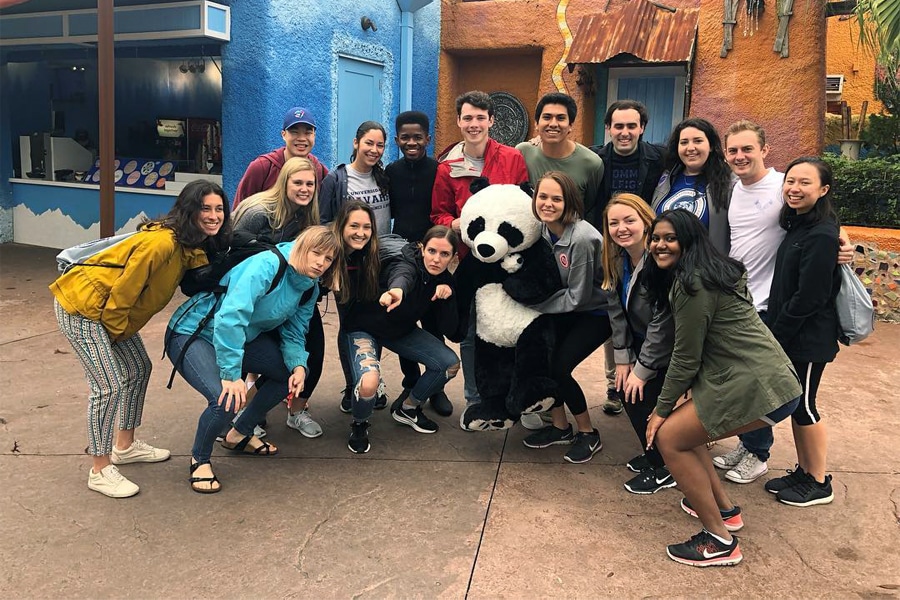
Network and explore
You’ll come out of your brainstorming sessions to network and socialize with global peers as eager to transform business as you are. In between, excursions take you to the sights and excitement of one of the world’s tourist capitals.
Participating schools
- Ateneo De Manila
- American University of Beirut
- Babes Bolyai University
- Chulalongkorn University
- Concordia University
- Corvinus University of Budapest
- HEC Montréal
- The Hong Kong University of Science and Technology
- Queensland University of Technology
- Universidad Panamericana
- University College Cork — National University of Ireland
- The University of Alabama
- University of Florida
- The University of Hong Kong
- University of Manitoba
Student testimonial

“This competition has taught me a great deal. From dealing with the new format of short presentations and lengthy discussions to leading a team of peers that brought their own strengths to figuring out how to level up my presentation skills beyond what I thought I was capable of.”
Rajesh P. Shubhangam
Nanyang Technological University
Why participate in the Heavener International Case Competition?
This is where all business school case competition teams strive to be — and where a win becomes a testament to your collective capabilities, creativity, and mastery.
Use real-world business skills
Pull out all the stops like an entrepreneur — from analyzing financial considerations to audience shifts — while honing the discerning, big-picture mindset of a consultant.
Career readiness
Strengthen how you collaborate, work on a team, and address problems, and practice communicating and defending your proposal to professionals who prize these skills in everyone they hire.
Work under pressure
Make every minute count as you turn to all you’ve learned in the classroom and beyond. Then, after presenting a solution to one problem, you’ll quickly pivot to devise something entirely different for your second challenge.
How far will your ideas go?
The Heavener International Case Competition encourages all teams to evaluate the soundness of their solutions in multiple markets, helping to foster a global perspective of business among all participants.
Attending the Heavener International Case Competition
Individual eligibility
The HICC is offered to universities that provide programs related to undergraduate business disciplines. Each individual participant in the HICC must meet all criteria:
- Participants must be full-time undergraduate students at a participating school, 26 years of age or younger.
- For students in the European University System: A student currently studying in or before the third year of specialized business education.
- For students in the North American system: A student currently studying in or before the fourth year of undergraduate education.
- The student may not have participated in HICC in a prior year.
Team compositions
Participating universities are permitted to enter one (1) team consisting of four (4) members and are allowed to be accompanied by one (1) or more coaches.
Should a team member become unable to participate due to unexpected illness or other reasons during the competition, the team may continue with the remaining members. Substitutions or alternates are not permitted.
Case tools
- Laptop
- Charger
- Adapter
- Provided case materials outlined in the Case Information section of the Rulebook
Travel items
- Toiletries
- Identification documents (e.g., passport)
- Phone
- Sunscreen
- Umbrella/rain gear
Clothes
Clothes for the week, including:
- Two (2) university T-shirts (one to wear at the kick-off ceremony and one to swap at the kick-off ceremony)
- Formal business attire (e.g., suits, blouses, blazers)
- Cocktail attire (e.g., semi-formal)
Dress code
- Kick-off ceremony: University T-shirt and an extra university T-shirt to swap with another participant
- Team pictures: HICC shirts
- Case presentations: Formal business attire
Tuesday dinner: Cocktail attire (e.g., semi-formal)
Known for the beauty of its natural surroundings, Gainesville serves as the cultural, educational, and commercial center for the north central Florida region and is home to the University of Florida, Florida’s largest and oldest university.
Gainesville’s numerous parks, museums, lakes, and many nearby natural springs provide entertainment to thousands of visitors each year. Because of its beautiful landscape and urban “forest,” Gainesville is one of the most attractive cities in Florida.
Heavener School of Business
Warrington College of Business
University of Florida
Gainesville, Florida
Hotel
AC Hotel Gainesville
151 NW 14th St.
Gainesville, FL 32603
352.792.1151
Transportation
Airports
Other airports within two to three hours of Gainesville:
- Jacksonville International Airport
- Tampa International Airport
- Orlando International Airport
- Tallahassee Airport
Getting around
All competition locations will be within walking distance of the host hotel. The university is across the street from the host hotel.
Rideshare services (Uber/Lyft) are also available in Gainesville.
Things to do
Gainesville is home to many cultural events, art and theater attractions, unique restaurants, and cuisine. Given the beautiful natural surroundings, outdoor activities are plentiful. Check out Visit Gainesville.
From Gainesville, you can easily visit major cities, Florida’s famous beaches, and theme parks. Just two hours to the west, Tampa and serene Gulf Coast beaches await; two hours to the east, you’ll find Jacksonville and the Atlantic coastal beaches, and two hours south, you’ll arrive in Orlando, the home of Disney World and Universal Studios theme parks.
Ashley Lau
President
Eli Makaron
VP of Operations
Hayden Roddy
Co-VP of Experiential Logistics
Madison Passmore
Co-VP of Experiential Logistics
Emma Arigo
VP of Hospitality
Ashton Bacon
VP of Communications
Heather Andrasik
VP of Marketing
Jimmy Hazlett
VP of Events
Drew Delimitros
VP of Sponsorships
Shea Berman
VP of Corporate Relations
Rulebook
General expectations
- Submitted materials (i.e., PowerPoint slides) and presentations must be in English.
- Preparation of cases will occur in competitors’ hotel rooms.
- Teams are encouraged to conduct substantial research about the case company/industry prior to arriving at the competition, if given the case companies.
Preparation materials
Provided materials:
- One (1) flip chart
- One (1) pack of four (4) colored markers
- Fifty (50) sheets of 8.5’’/11’’ paper
Allowed, but not provided materials:
- Calculators of any sort
- Additional stationery material (e.g., Post-it notes, pens, pencils)
- Four (4) laptops with the ability to connect to Wi-Fi networks
- Prepared documentation, research, and notes
- Prepared presentation PowerPoint decks (i.e., templates) are allowed and encouraged
External communication
Teams are prohibited from communicating with any outside party during the time they are working on the case.
For Case 1, teams are prohibited from engaging in discussion about the case with anyone other than their team members until after the Question-and-Answer period.
For Case 2, teams are prohibited from engaging in communication with their coach until the finalists are announced. Finalists are prohibited from engaging in communication with their coach until after they have completed the Question-and-Answer period for the final round of presentations.
Division selection and team names
- Teams will be divided into four (4) divisions.
- Universities will be assigned a division by a random draw.
- Universities will present under a chosen team name (e.g., “ABC Consulting”). Team names may not identify the participants’ university or home country by any means (e.g., school colors, mascots, national symbols).
Case 1: 9 hours
- One pre-read
- Three-minute uninterrupted overview
- 22-minute discussion
- Two summary slides (not including title slide) and unlimited appendix slides
Case 2: 28 hours
- One pre-read
- Five-minute uninterrupted overview
- 20-minute discussion
- Five summary slides (not including title slide) and unlimited appendix slides
Case 1
Deliverables
- For Case 1, teams must submit the presentation in both PDF and PowerPoint file formats (.ppt or .pptx).
- A one-page pre-read to give to the judges that provides an overview of your recommendations is submitted the night before.
- PowerPoint deck with two summary slides providing an overview of your recommendations, followed by unlimited appendix slides supporting your recommendations.
- The PowerPoint slide size is widescreen (16:9).
Presentation
Teams will present using one (1) personal laptop.
Teams will have three (3) uninterrupted minutes to present a summary of their recommendations. Teams may not access their appendix slides during this portion. Accessing the appendix slides during this portion will result in a last-place finish.
When the three minutes have elapsed, the room monitor will announce the start of the 22-minute discussion period. Teams may access and are encouraged to use their appendix slides during this period.
There is no requirement on the number of team members who need to speak during the three-minute presentation; however, all team members must speak during the discussion period.
Time signals of ten (10), five (5), two (2), and one (1) will be given for the discussion period. A one (1) minute signal will be given for the three-minute pitch.
After the time has elapsed, the presenters will be cut off if they are still speaking.
The judging panel will have access to virtual copies of the presentation.
Case 2
Deliverables
- For Case 2, teams must submit the presentation in both PDF and PowerPoint file formats (.ppt or .pptx).
- A one-page pre-read to give to the judges that provides an overview of your recommendations is submitted the night before.
- A PowerPoint deck with summary slides (five slide limit) providing an overview of your recommendations, followed by unlimited appendix slides supporting your recommendations.
- The PowerPoint slide size is widescreen (16:9).
Presentation
Teams will present using a provided computer.
Teams will have five (5) uninterrupted minutes to present a summary of their recommendations. Teams may not access their appendix slides during this portion. Accessing the appendix slides during this portion will result in a last-place finish. There is no requirement on the number of team members who need to speak during the five-minute presentation.
When the five minutes have elapsed, the room monitor will announce the start of the 20-minute discussion period. Teams may access and are encouraged to use their appendix slides during this period. All team members must speak during the discussion period, and failure for every team member to speak during the 20-minute time frame results in a last-place finish.
Time signals of ten (10), five (5), two (2), and one (1) will be given for the discussion period. A one-minute (1) signal will be given for the five-minute overview.
After the time has elapsed, the presenters will be cut off if they are still speaking.
The judging panel will have access to virtual copies of the presentation.
Deliverables
- The team with the highest number of points in each division will present in the final round. In the event of a tie, the team with the highest score for the long case will advance.
- Teams will re-present their Case 2 presentation in the final round. Teams are not allowed to modify their PowerPoint in any way between the divisional and final rounds.
- The order of the finalist presentations will be chosen at random.
Presentation
Presentation format follows Case 2 instructions.
Case weighting: Case 1 (9 hours)
- Case 1 is weighted at 25% for final round eligibility.
- Teams will choose their presentation time for Case 2 in the order they are ranked for Case 1. For example, the first-place team in Case 1 will be the first team in their division to choose which presentation time they want for Case 2.
Case weighting: Case 2 (28 hours)
- Case 2 is weighted at 75% for final round eligibility.
- The team in each division with the highest allocated points after Case 2 will present in the final round.
- In the event of a tie, the team with the highest score for the long case will advance.
Case weighting: Point allocation
| Case | Weighting | 1st | 2nd | 3rd | 4th |
|---|---|---|---|---|---|
| 1 | 25% | 10 | 7.5 | 5 | 2.5 |
| 2 | 75% | 30 | 22.5 | 15 | 7.5 |
Case evaluation
Each case presentation will be evaluated by a panel of at least two (2) judges, with no maximum number of judges.
The judging panels will consist of case company representatives and industry professionals (e.g., consultants, bankers, etc.). There will be zero (0) academic staff on the judging panels.
The judges will rank the teams in their appointed divisions, with points allocated to teams as listed in the above table.
Spectator attendance
Competitors may not attend any other presentations during the three divisional rounds; however, all competitors are welcome and encouraged to watch the finalist presentations.
Finalist teams may only watch the remainder of the finalist presentations after they have presented.
Team coaches are allowed to attend all presentations in their assigned divisions. Coaches are not allowed to attend presentations from teams of another division.
The final round will be open to the public.
Case feedback
After all presentations, teams will be allowed ten (10) minutes of feedback from the judging panels. During this period, the teams are welcome to ask questions about ways to improve or just listen to the feedback.
Coaches are only allowed to attend the feedback for their team.
Rankings will not be given during the feedback session, and teams are not allowed to ask for their rankings.
The Organizing Committee reserves the right to disqualify any team for violating any of the above rules. The right to disqualification extends to areas of competition not explicitly outlined in this rulebook, such as general conduct throughout the competition. Decisions by the committee are binding and non-negotiable.

Questions?
M. Sean Limon
Bryan Hall 233L
PO Box 117150
Gainesville, Florida 32611-7150
352-273-3214